牛津译林版(2019)必修 第二册Unit 4 Exploring literature Grammar and usage—Modal verbs课件(32张ppt)
文档属性
| 名称 | 牛津译林版(2019)必修 第二册Unit 4 Exploring literature Grammar and usage—Modal verbs课件(32张ppt) | 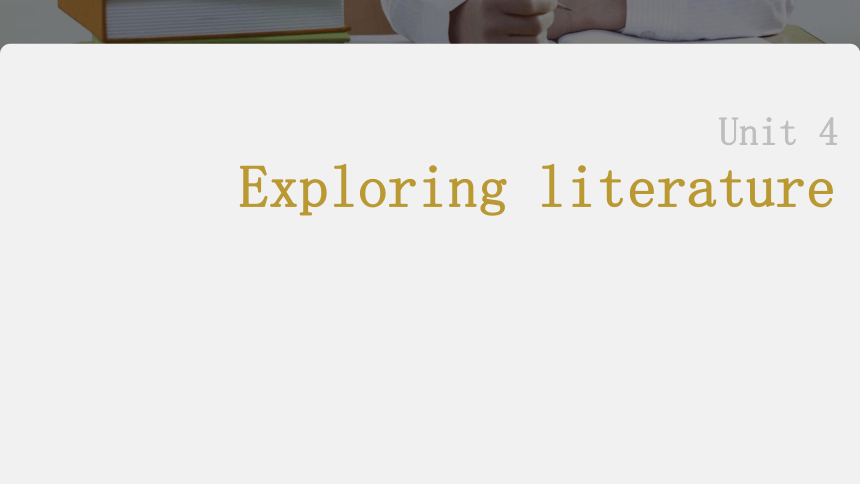 | |
| 格式 | pptx | ||
| 文件大小 | 2.2MB | ||
| 资源类型 | 教案 | ||
| 版本资源 | 牛津译林版(2019) | ||
| 科目 | 英语 | ||
| 更新时间 | 2023-05-25 12:01:17 | ||
图片预览

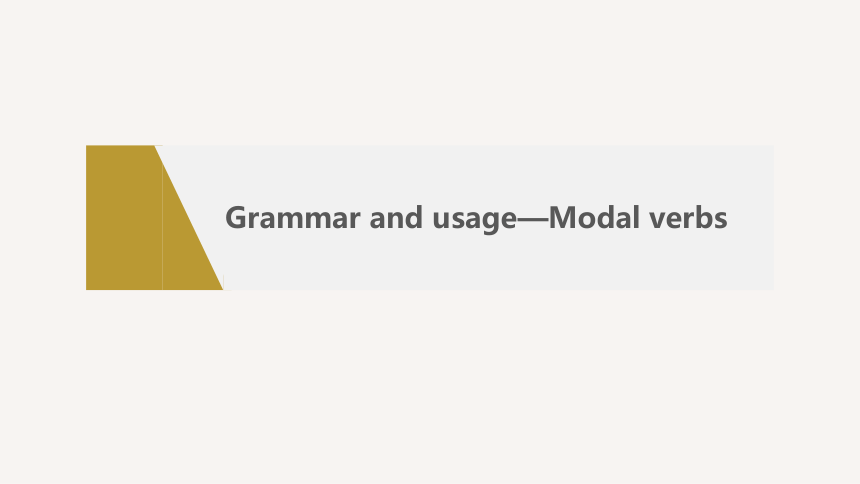
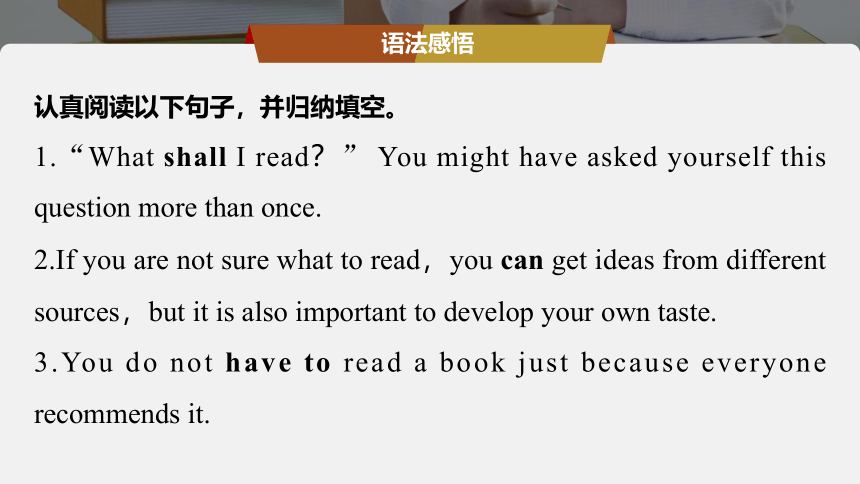
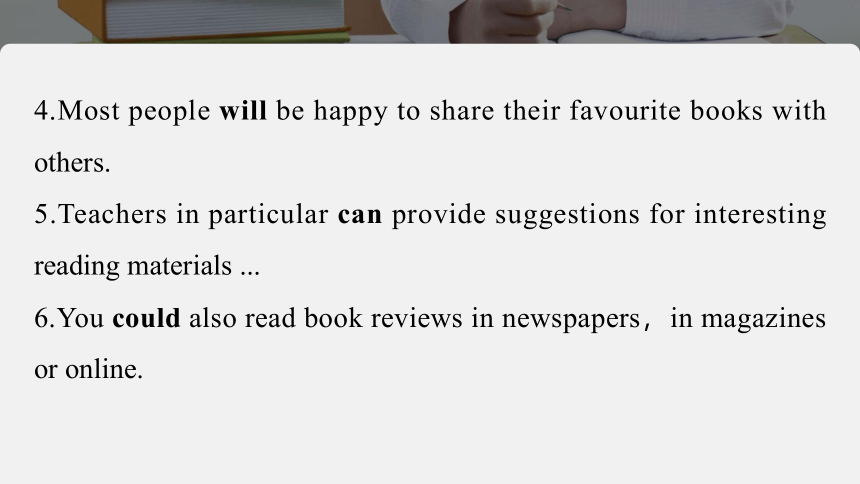
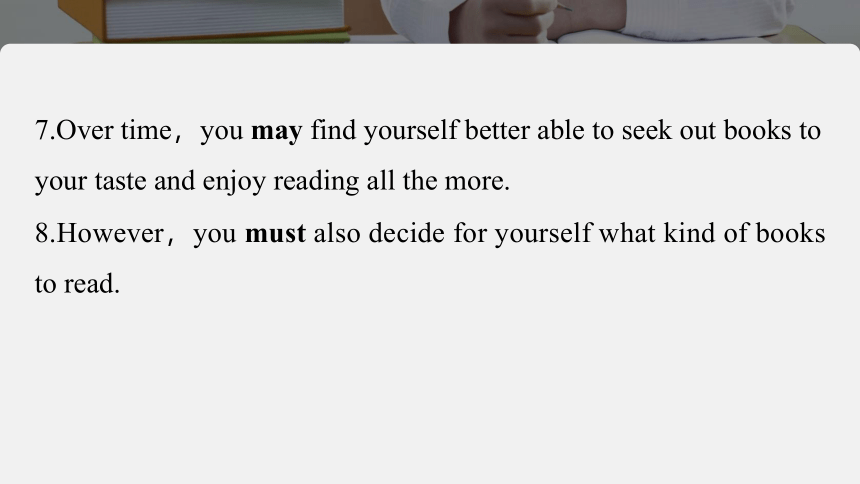
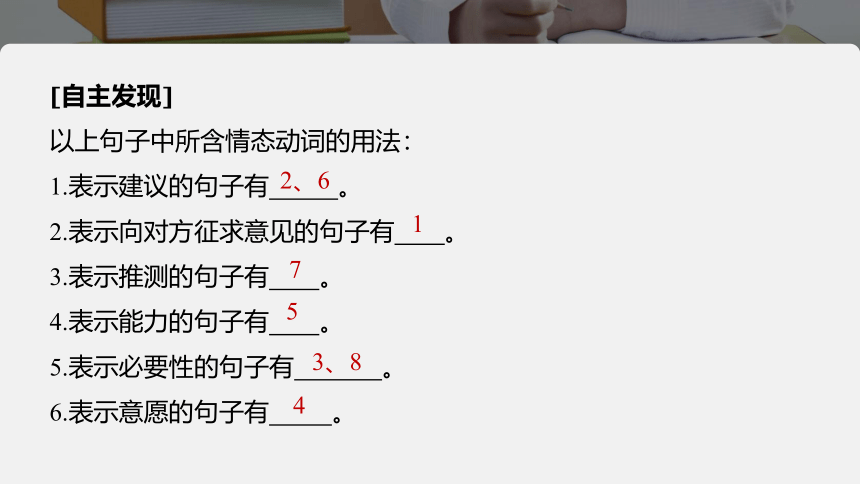
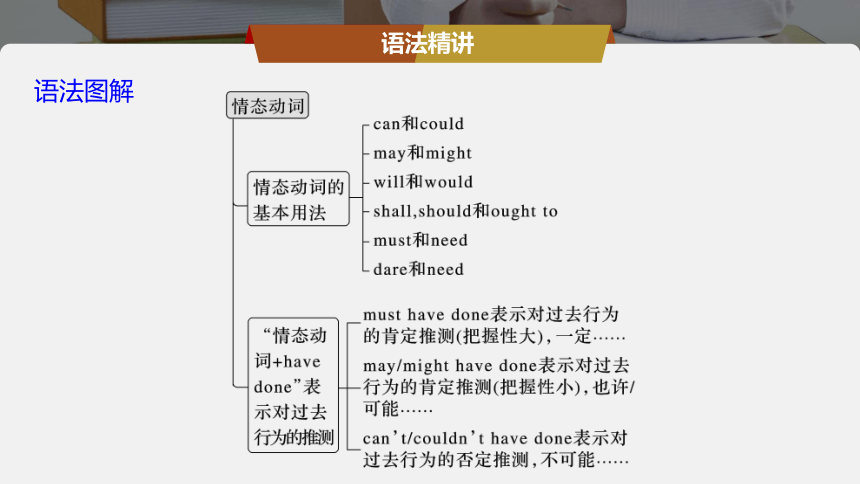
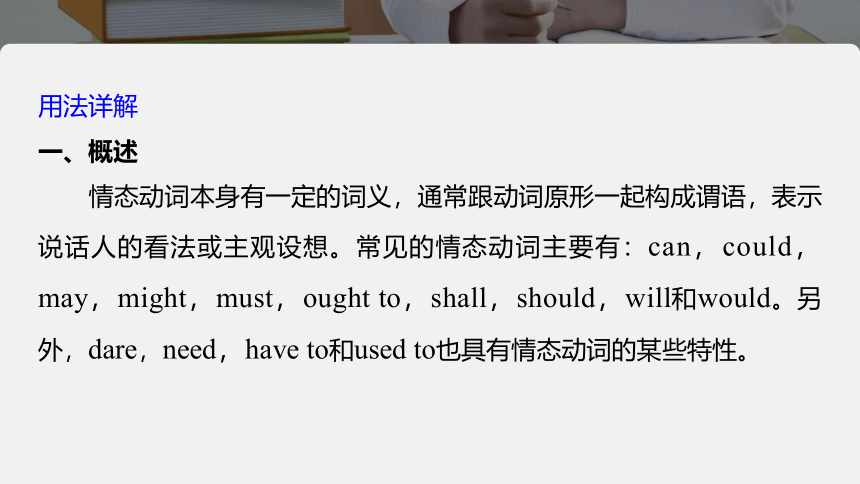

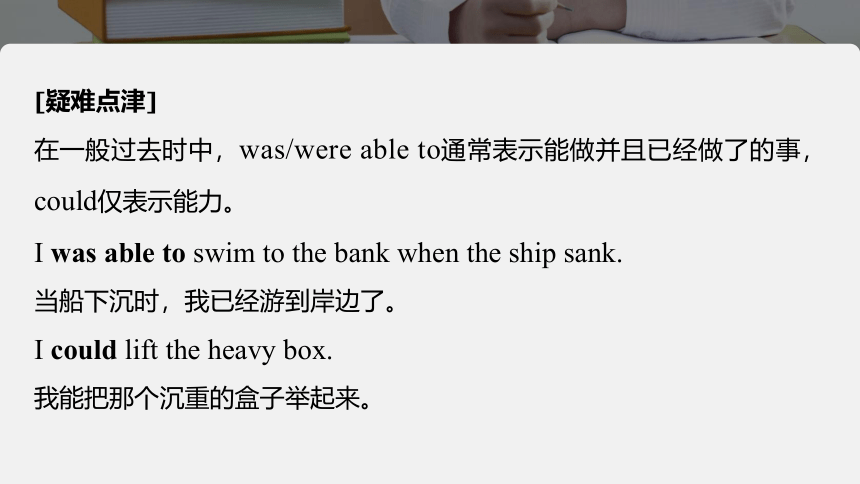

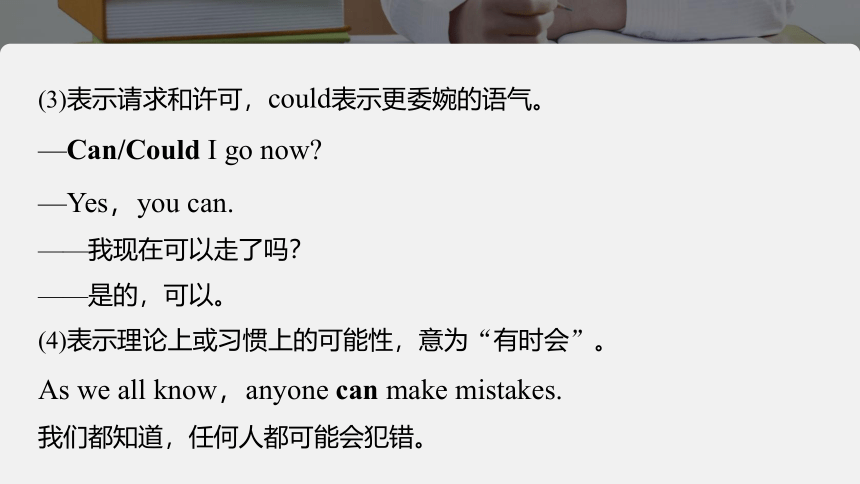
文档简介
(共32张PPT)
Unit 4
Exploring literature
Grammar and usage—Modal verbs
语法感悟
认真阅读以下句子,并归纳填空。
1.“What shall I read?” You might have asked yourself this question more than once.
2.If you are not sure what to read,you can get ideas from different sources,but it is also important to develop your own taste.
3.You do not have to read a book just because everyone recommends it.
4.Most people will be happy to share their favourite books with others.
5.Teachers in particular can provide suggestions for interesting reading materials ...
6.You could also read book reviews in newspapers,in magazines or online.
7.Over time,you may find yourself better able to seek out books to your taste and enjoy reading all the more.
8.However,you must also decide for yourself what kind of books to read.
[自主发现]
以上句子中所含情态动词的用法:
1.表示建议的句子有 。
2.表示向对方征求意见的句子有 。
3.表示推测的句子有 。
4.表示能力的句子有 。
5.表示必要性的句子有 。
6.表示意愿的句子有 。
2、6
1
7
5
3、8
4
语法图解
语法精讲
用法详解
一、概述
情态动词本身有一定的词义,通常跟动词原形一起构成谓语,表示说话人的看法或主观设想。常见的情态动词主要有:can,could,may,might,must,ought to,shall,should,will和would。另外,dare,need,have to和used to也具有情态动词的某些特性。
二、情态动词的基本用法
1.can与could的用法
(1)表示能力,此时could是can的过去式,意思相当于be able to。
My grandmother can do some shopping on the Internet,but she couldn’t last year.
我奶奶会网购了,但是去年她还不会。
[疑难点津]
在一般过去时中,was/were able to通常表示能做并且已经做了的事,could仅表示能力。
I was able to swim to the bank when the ship sank.
当船下沉时,我已经游到岸边了。
I could lift the heavy box.
我能把那个沉重的盒子举起来。
(2)表示可能性,一般用于疑问句和否定句中,can’t/couldn’t意为“不可能”。
Can this news be true?这则消息可能是真的吗?
Your story can’t/couldn’t be true.
你的故事不可能是真的。
(3)表示请求和许可,could表示更委婉的语气。
—Can/Could I go now
—Yes,you can.
——我现在可以走了吗?
——是的,可以。
(4)表示理论上或习惯上的可能性,意为“有时会”。
As we all know,anyone can make mistakes.
我们都知道,任何人都可能会犯错。
2.may与might的用法
(1)表示允许、许可。might在语气上比may更委婉。
May/Might I play computer games after supper?晚饭后我可以玩电脑游戏吗?
(2)表示可能性,用于肯定句。
I think he may come tomorrow.
我认为明天他可能会来。
3.must与need的用法
(1)表示必要性。must意为“必须”,其否定式为mustn’t(不准,禁止)。need意为“需要”,其否定式为needn’t(不必)。
You mustn’t do that,because you must keep your word.
你不准那么做,因为你必须得遵守诺言。
You needn’t do it if you don’t want to.
如果你不想做,你就不必做。
(2)must表示可能性,只能用在肯定句中,意为“一定,准是”。
You have worked hard all day.You must be tired.
辛苦工作了一整天,你一定累了。(对现在情况的推测判断)
(3)must带有感彩,意为“偏偏,偏要”,常指令人不快的事情。
The car must break down just when I was about to start.我正要出发时车偏偏抛锚了。
4.will与would的用法
(1)表示意志、意愿和决心。will指现在,would指过去。
I will never do that again.我再也不那样做了。
They said that they would fight against the haze.他们说会与雾霾作斗争的。
(2)表示请求。would表示更委婉的语气。
Will/Would you please take a message for me
你能帮我捎个口信吗?
(3)表示规律性的“注定会”或习惯性的动作,意为“总是;习惯于”。will指现在,would指过去。
Fish will die without water.
没有水鱼儿就会死。
We would sit around Grandpa after supper,listening to his stories.过去,晚饭后我们总会坐在爷爷周围,听他讲故事。
[疑难点津]
used to也表示过去的习惯性动作,多用于非正式场合,往往指后来停止了的动作。否定形式是didn’t use to或used not to。
He used to take a walk near the forest in the evening.
他过去常在晚间到森林附近散步。(而现在已不在那里散步了)
5.shall的用法
(1)shall用于第一、三人称的疑问句中,表示说话人征求对方的意见或请求。
What shall I/we do next
我/我们下一步该做什么?
When shall my brother be able to leave hospital?我哥哥什么时候可以出院?
(2)shall用于第二、三人称的陈述句中,表示说话人给对方命令、警告、允诺或威胁等。
You shall go with me.你跟我走。
You shall have a new dress for your birthday.你在生日时会得到一件新连衣裙。
He shall suffer for this.他会为此事吃苦头的。
(3)用于第三人称的陈述句中,表示正式文件、法律、规章制度等中的义务或规定。
Students shall not use calculators during exams.学生在考试中不得使用计算器。
No readers shall remove a book from the library without the consent of the librarian.
不经图书管理员的同意,读者不准把书带出图书馆。
6.should与ought to的用法
(1)should表示义务或建议,意为“应该”,其同义词是ought to。
You should/ought to go to class right away.
你应该立刻去上课。
(2)should与ought to也可以表示主观判断,意思是“可能会,应该会”。
It’s nine o’clock now.My mother should come back.现在九点钟了,我妈妈应该回来了。
7.dare与need的用法
dare和need既可以作实义动词,也可以作情态动词。
(1)dare和need作情态动词时,多用于疑问句、否定句中。
I dare not walk through the wood at night.
夜间我不敢在树林里走。
You needn’t worry about it.你没有必要担心它。
(2)dare作实义动词时,在否定句、疑问句中不定式符号to可以省略。need作实义动词时,后可接名词、动名词、不定式等,有人称、时态和数的变化。
The children don’t dare (to) make a sound while their parents are sleeping.
孩子们在父母睡觉时不敢弄出一点声音。
The bike needs repairing.=The bike needs to be repaired.这辆自行车需要修理。
三、情态动词后的动词的时态形式
情态动词后接的动词可以有一般式、进行式、完成式、完成进行式四种形式。其一般式为“情态动词+动词原形”,表示情态动词的基本含义。
1.后接进行式,表示对正在发生的事情的推测。
He must be doing his homework now.
他现在肯定在做他的家庭作业。
2.后接完成式,表示对过去情况的推测或与事实相反的虚拟。
You can’t have seen Mary yesterday because she was in Paris.
你昨天不可能见到玛丽,因为她在巴黎。
You failed again.You should have done it much better.你又失败了。你本该做得更好的。
3.后接完成进行式,表示对持续动作的推测。
They are too tired now.They must have been working all day.
他们现在太累了。他们肯定一整天都在工作。
四、“情态动词+have done”表示对过去的推测
1.must have done表示对过去发生的事或行为的肯定推测,把握性大,意为“一定做过某事”,只用于肯定句中。
Since she had not answered his letter she must have left there.
由于她没有给他回信,她一定是已经离开那里了。
2.may/might have done表示对过去行为的推测,把握性小,意为“也许已经做过某事”,主要用于肯定句和否定句中。
John isn’t at home.I think he may/might have gone to school.约翰不在家,我想他可能去上学了吧。
3.can’t/couldn’t have done表示对过去发生的事或行为的否定推测,意为“不可能做过某事”,可通用。can’t语气更加强烈一些。
She can’t/couldn’t have heard you knocking at the door.她不可能听见你敲门。
I 1. not read with my eyes painful.My roommate suggested I should have an eye examination.“You 2. go to the hospital and the doctor 3. help you find out why,” he said.
从方框中选择合适的情态动词填空
达标检测
could
may,dare,could,mustn’t,be able to,must,had to,had better,should,needn’t
had better
may
When I arrived at the hospital,I found many people waiting there.So I 4. wait for my turn.When it was my turn,the doctor examined my eyes carefully and said,“I 5. say you don’t protect your eyes well.But you 6. worry about it.Use some medicine and you 7. make your eyes so tired,and soon you will 8. recover.” I said to myself,“I
9. have protected my eyes.”
dare
had to
should
needn’t
mustn’t
be able to
After returning,I told my roommate,“There is nothing serious with my eyes,but from now on I 10. try to protect my eyes.”
must
本课结束
Unit 4
Exploring literature
Grammar and usage—Modal verbs
语法感悟
认真阅读以下句子,并归纳填空。
1.“What shall I read?” You might have asked yourself this question more than once.
2.If you are not sure what to read,you can get ideas from different sources,but it is also important to develop your own taste.
3.You do not have to read a book just because everyone recommends it.
4.Most people will be happy to share their favourite books with others.
5.Teachers in particular can provide suggestions for interesting reading materials ...
6.You could also read book reviews in newspapers,in magazines or online.
7.Over time,you may find yourself better able to seek out books to your taste and enjoy reading all the more.
8.However,you must also decide for yourself what kind of books to read.
[自主发现]
以上句子中所含情态动词的用法:
1.表示建议的句子有 。
2.表示向对方征求意见的句子有 。
3.表示推测的句子有 。
4.表示能力的句子有 。
5.表示必要性的句子有 。
6.表示意愿的句子有 。
2、6
1
7
5
3、8
4
语法图解
语法精讲
用法详解
一、概述
情态动词本身有一定的词义,通常跟动词原形一起构成谓语,表示说话人的看法或主观设想。常见的情态动词主要有:can,could,may,might,must,ought to,shall,should,will和would。另外,dare,need,have to和used to也具有情态动词的某些特性。
二、情态动词的基本用法
1.can与could的用法
(1)表示能力,此时could是can的过去式,意思相当于be able to。
My grandmother can do some shopping on the Internet,but she couldn’t last year.
我奶奶会网购了,但是去年她还不会。
[疑难点津]
在一般过去时中,was/were able to通常表示能做并且已经做了的事,could仅表示能力。
I was able to swim to the bank when the ship sank.
当船下沉时,我已经游到岸边了。
I could lift the heavy box.
我能把那个沉重的盒子举起来。
(2)表示可能性,一般用于疑问句和否定句中,can’t/couldn’t意为“不可能”。
Can this news be true?这则消息可能是真的吗?
Your story can’t/couldn’t be true.
你的故事不可能是真的。
(3)表示请求和许可,could表示更委婉的语气。
—Can/Could I go now
—Yes,you can.
——我现在可以走了吗?
——是的,可以。
(4)表示理论上或习惯上的可能性,意为“有时会”。
As we all know,anyone can make mistakes.
我们都知道,任何人都可能会犯错。
2.may与might的用法
(1)表示允许、许可。might在语气上比may更委婉。
May/Might I play computer games after supper?晚饭后我可以玩电脑游戏吗?
(2)表示可能性,用于肯定句。
I think he may come tomorrow.
我认为明天他可能会来。
3.must与need的用法
(1)表示必要性。must意为“必须”,其否定式为mustn’t(不准,禁止)。need意为“需要”,其否定式为needn’t(不必)。
You mustn’t do that,because you must keep your word.
你不准那么做,因为你必须得遵守诺言。
You needn’t do it if you don’t want to.
如果你不想做,你就不必做。
(2)must表示可能性,只能用在肯定句中,意为“一定,准是”。
You have worked hard all day.You must be tired.
辛苦工作了一整天,你一定累了。(对现在情况的推测判断)
(3)must带有感彩,意为“偏偏,偏要”,常指令人不快的事情。
The car must break down just when I was about to start.我正要出发时车偏偏抛锚了。
4.will与would的用法
(1)表示意志、意愿和决心。will指现在,would指过去。
I will never do that again.我再也不那样做了。
They said that they would fight against the haze.他们说会与雾霾作斗争的。
(2)表示请求。would表示更委婉的语气。
Will/Would you please take a message for me
你能帮我捎个口信吗?
(3)表示规律性的“注定会”或习惯性的动作,意为“总是;习惯于”。will指现在,would指过去。
Fish will die without water.
没有水鱼儿就会死。
We would sit around Grandpa after supper,listening to his stories.过去,晚饭后我们总会坐在爷爷周围,听他讲故事。
[疑难点津]
used to也表示过去的习惯性动作,多用于非正式场合,往往指后来停止了的动作。否定形式是didn’t use to或used not to。
He used to take a walk near the forest in the evening.
他过去常在晚间到森林附近散步。(而现在已不在那里散步了)
5.shall的用法
(1)shall用于第一、三人称的疑问句中,表示说话人征求对方的意见或请求。
What shall I/we do next
我/我们下一步该做什么?
When shall my brother be able to leave hospital?我哥哥什么时候可以出院?
(2)shall用于第二、三人称的陈述句中,表示说话人给对方命令、警告、允诺或威胁等。
You shall go with me.你跟我走。
You shall have a new dress for your birthday.你在生日时会得到一件新连衣裙。
He shall suffer for this.他会为此事吃苦头的。
(3)用于第三人称的陈述句中,表示正式文件、法律、规章制度等中的义务或规定。
Students shall not use calculators during exams.学生在考试中不得使用计算器。
No readers shall remove a book from the library without the consent of the librarian.
不经图书管理员的同意,读者不准把书带出图书馆。
6.should与ought to的用法
(1)should表示义务或建议,意为“应该”,其同义词是ought to。
You should/ought to go to class right away.
你应该立刻去上课。
(2)should与ought to也可以表示主观判断,意思是“可能会,应该会”。
It’s nine o’clock now.My mother should come back.现在九点钟了,我妈妈应该回来了。
7.dare与need的用法
dare和need既可以作实义动词,也可以作情态动词。
(1)dare和need作情态动词时,多用于疑问句、否定句中。
I dare not walk through the wood at night.
夜间我不敢在树林里走。
You needn’t worry about it.你没有必要担心它。
(2)dare作实义动词时,在否定句、疑问句中不定式符号to可以省略。need作实义动词时,后可接名词、动名词、不定式等,有人称、时态和数的变化。
The children don’t dare (to) make a sound while their parents are sleeping.
孩子们在父母睡觉时不敢弄出一点声音。
The bike needs repairing.=The bike needs to be repaired.这辆自行车需要修理。
三、情态动词后的动词的时态形式
情态动词后接的动词可以有一般式、进行式、完成式、完成进行式四种形式。其一般式为“情态动词+动词原形”,表示情态动词的基本含义。
1.后接进行式,表示对正在发生的事情的推测。
He must be doing his homework now.
他现在肯定在做他的家庭作业。
2.后接完成式,表示对过去情况的推测或与事实相反的虚拟。
You can’t have seen Mary yesterday because she was in Paris.
你昨天不可能见到玛丽,因为她在巴黎。
You failed again.You should have done it much better.你又失败了。你本该做得更好的。
3.后接完成进行式,表示对持续动作的推测。
They are too tired now.They must have been working all day.
他们现在太累了。他们肯定一整天都在工作。
四、“情态动词+have done”表示对过去的推测
1.must have done表示对过去发生的事或行为的肯定推测,把握性大,意为“一定做过某事”,只用于肯定句中。
Since she had not answered his letter she must have left there.
由于她没有给他回信,她一定是已经离开那里了。
2.may/might have done表示对过去行为的推测,把握性小,意为“也许已经做过某事”,主要用于肯定句和否定句中。
John isn’t at home.I think he may/might have gone to school.约翰不在家,我想他可能去上学了吧。
3.can’t/couldn’t have done表示对过去发生的事或行为的否定推测,意为“不可能做过某事”,可通用。can’t语气更加强烈一些。
She can’t/couldn’t have heard you knocking at the door.她不可能听见你敲门。
I 1. not read with my eyes painful.My roommate suggested I should have an eye examination.“You 2. go to the hospital and the doctor 3. help you find out why,” he said.
从方框中选择合适的情态动词填空
达标检测
could
may,dare,could,mustn’t,be able to,must,had to,had better,should,needn’t
had better
may
When I arrived at the hospital,I found many people waiting there.So I 4. wait for my turn.When it was my turn,the doctor examined my eyes carefully and said,“I 5. say you don’t protect your eyes well.But you 6. worry about it.Use some medicine and you 7. make your eyes so tired,and soon you will 8. recover.” I said to myself,“I
9. have protected my eyes.”
dare
had to
should
needn’t
mustn’t
be able to
After returning,I told my roommate,“There is nothing serious with my eyes,but from now on I 10. try to protect my eyes.”
must
本课结束
